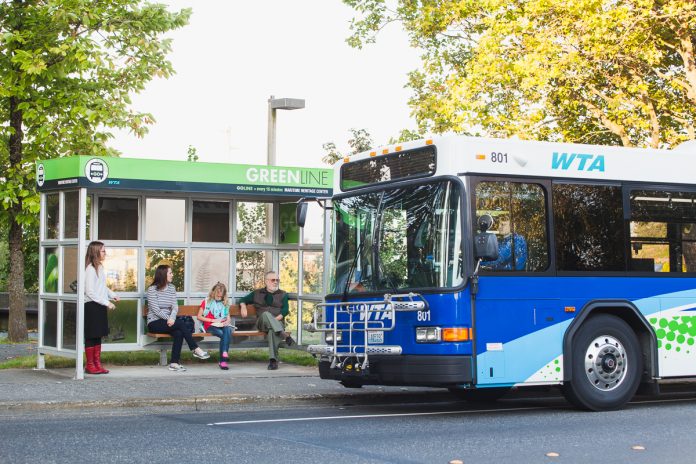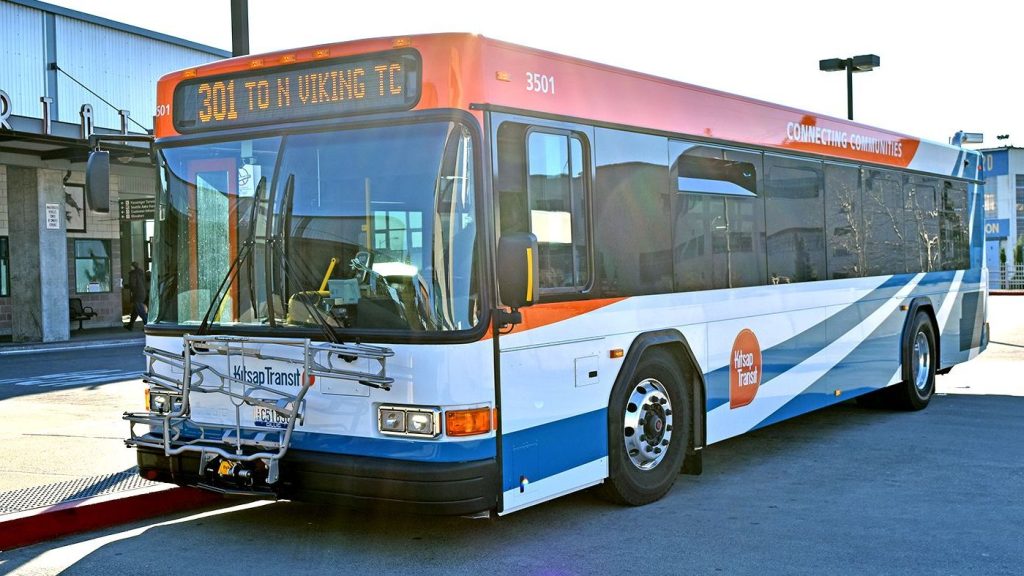
Public transit agency boards making decisions that impact the daily lives of thousands of riders could soon see direct representation for those riders, allowing them to have a voice and a vote, under a proposal advancing at the Washington State Legislature.
House Bill 2191, sponsored by Representative Joe Timmons (D-42, Bellingham), would allow — not require — around two-thirds of the transit agencies in Washington State to appoint two designated rider representatives to their boards, which are currently made up almost entirely of elected officials from inside their service areas. One of those representatives is required to be someone who directly relies on public transit as their primary mode of mobility, and the other to represent an organization that serves transit-dependent individuals.
The bill also makes it explicit in state law that public transit agency boards have to hold their meetings in locations that are accessible by transit, something so obvious that it’s hard to believe even has to be codified.
“It’s really meant to try to improve the process on how we can best serve those who are most served which are transit riders,” Rep. Timmons said introducing his bill for the first time this past Monday in the House Transportation Committee. “Whether it is going to work, whether it’s going to school, whether it’s going to grocery store, our transit agencies provide such a fantastic and unique service around the state and those who are most dependent on transit I think deserve a seat at the table to make decisions as a voting member.”
The bill would only apply to transit agencies formed under state law as public transit benefit areas (PTBAs), rather than directly managed by a city or county’s legislative body, or as a regional transit authority (RTA), which only exists in Washington as Sound Transit. The 21 PTBAs that the change would apply to include Community Transit in Snohomish County, Pierce Transit in Pierce County, Intercity Transit in Thurston County, and Kitsap Transit in Kitsap County. Along with Sound Transit, King County Metro and Everett Transit are a few of the transit agencies that the proposal wouldn’t apply to.
“I see that there are many transit agencies that do not realize the full potential of their ridership,” Judy Jones, who serves on the Skagit Transit Advisory Committee, told the House Transportation Committee on Monday. “Many on these boards of authority have never experienced mass transit in a personal way, making decisions without understanding the ramifications to the ridership in their daily lives in the communities they serve.”
Advocates for the bill point to episodes like the one that occurred in Spokane last year, where a member of Spokane Transit Authority’s board and the agency’s CEO coordinated behind the scenes to try and quash a proposal put forward by Spokane City Councilmember Zack Zappone to consider reduced fare policies for lower-income riders. Those efforts came to light only due to reporting by RANGE detailing the extent of the coordination. Having dedicated rider representatives on the board could have provided a counterforce to those backroom dealings.

Lindsey Schromen-Wawrin, a councilmember in the city of Port Angeles who serves on the Clallam Transit board, spoke in favor of the bill Monday. “Frankly, few of us are transit riders, and honestly the transit board is just one of many other committee assignments that every one of us serves on,” he said. “None of us ran for City Council or County Commission to serve on the transit board. But in our last board composition review, we concluded that the state statute that determines who may be a transit board member probably prohibits us from including our members… riders are the missing voice at our board meetings and should be fully involved in transit agency decision making.”
Official representatives of the transit agencies impacted, on the other hand, haven’t fully embraced the idea. In testimony this week, representatives for Whatcom Transit Authority, Kitsap Transit, and Community Transit didn’t oppose the bill, but instead tried to highlight the way that they’re currently engaging riders when it comes to potential changes, clearly making a case that legislators shouldn’t upset the apple cart.
“[Community Transit] recognizes that the community has a right to be involved in and informed about decisions related to services or projects that may impact them,” Chelsea Ongaro, Community Transit’s public engagement program manager, told the committee. “Our service planners and other groups across the agency greatly value the input we hear from our communities. Just recently, input from the community helped shape our plans in a variety of ways: our planners made major changes between phases two and three of our ‘Transit Changes in 2024 and Beyond’ service plan to capture community input on route frequency, span, and coverage.”
Ongaro touted a survey response that garnered over 1,000 responses around potential changes to service.
But with a majority of transit board members able to override that feedback from riders, there’s no guarantee that riders will have a seat at the table that’s less susceptible to political interference and pressure to go along to get along.
While clearly not a panacea for the intense challenges that Washington’s transit agencies are facing against a backdrop of operator shortages and budget shortfalls, dedicated rider representatives on transit boards could go a long way in ensuring that voices that are often minimized get uplifted instead.
House Bill 2191 is set to be voted on in the House Transportation Committee today. Its Senate counterpart, Senate Bill 6185, has a hearing in the Senate Transportation Committee next Monday.
Ryan Packer has been writing for The Urbanist since 2015, and currently reports full-time as Contributing Editor. Their beats are transportation, land use, public space, traffic safety, and obscure community meetings. Packer has also reported for other regional outlets including Capitol Hill Seattle, BikePortland, Seattle Met, and PubliCola. They live in the Capitol Hill neighborhood of Seattle.


